|
13 Bank Street (7 Black Boy Lane 1891 )
(High Street 1841 )
(High Street 1841 ) )
Sevenoaks
01732 452192
https://www.blackboysevenoaks.co.uk/
https://whatpub.com/black-boy
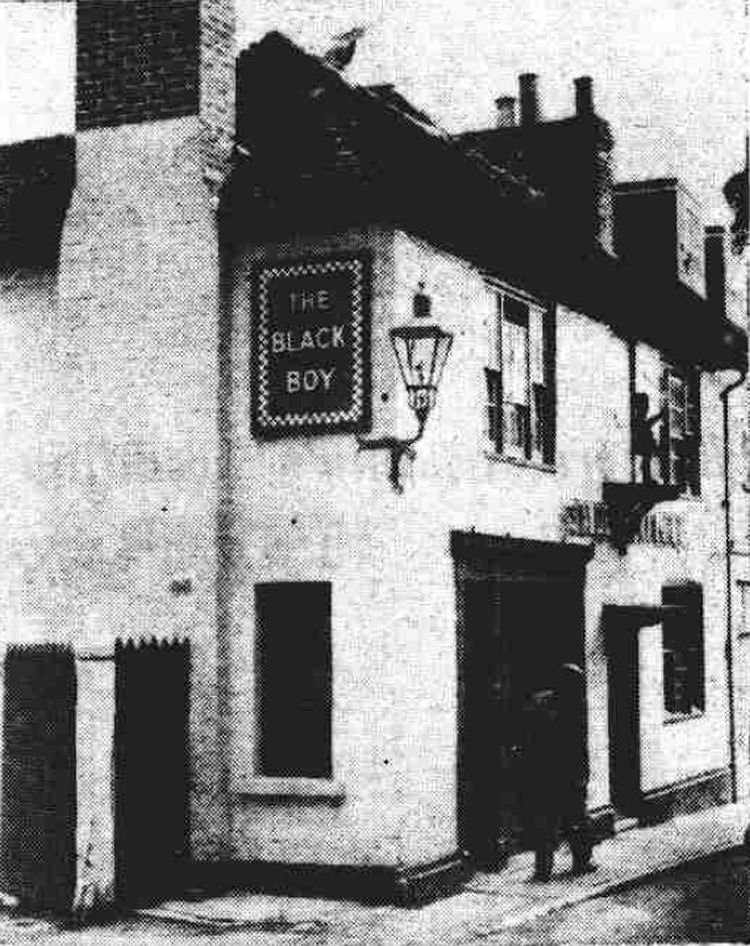
Above photo 1949. |
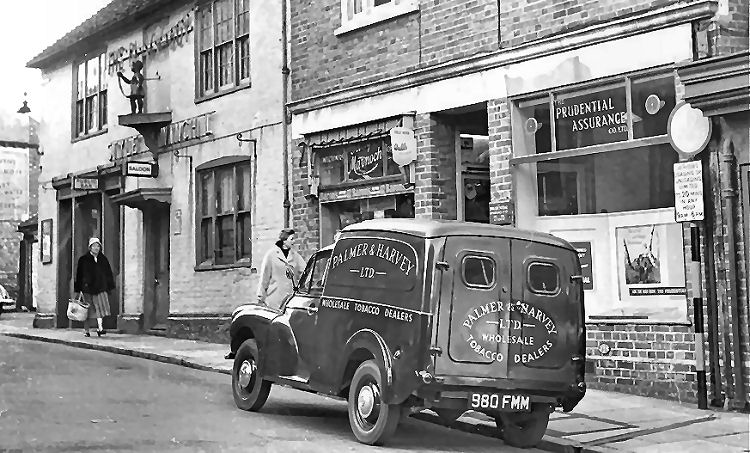
Above photo circa 1959. |
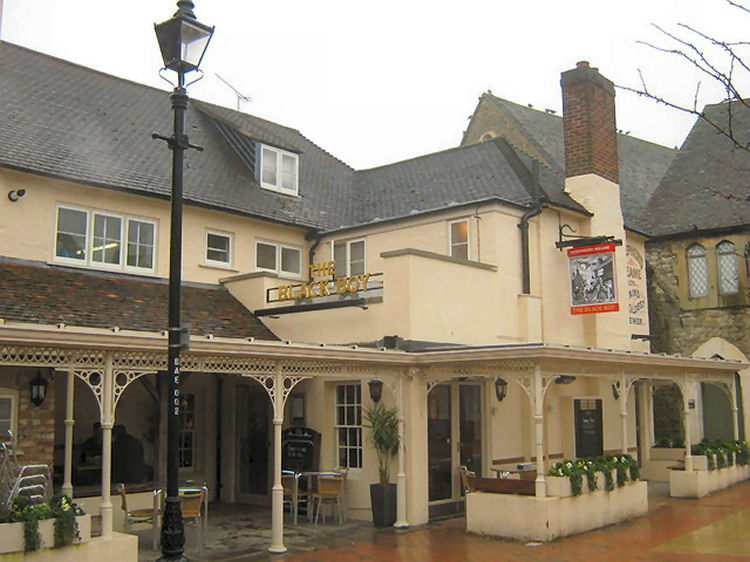
Above photo 2011 by David Anstiss
Creative Commons Licence. |
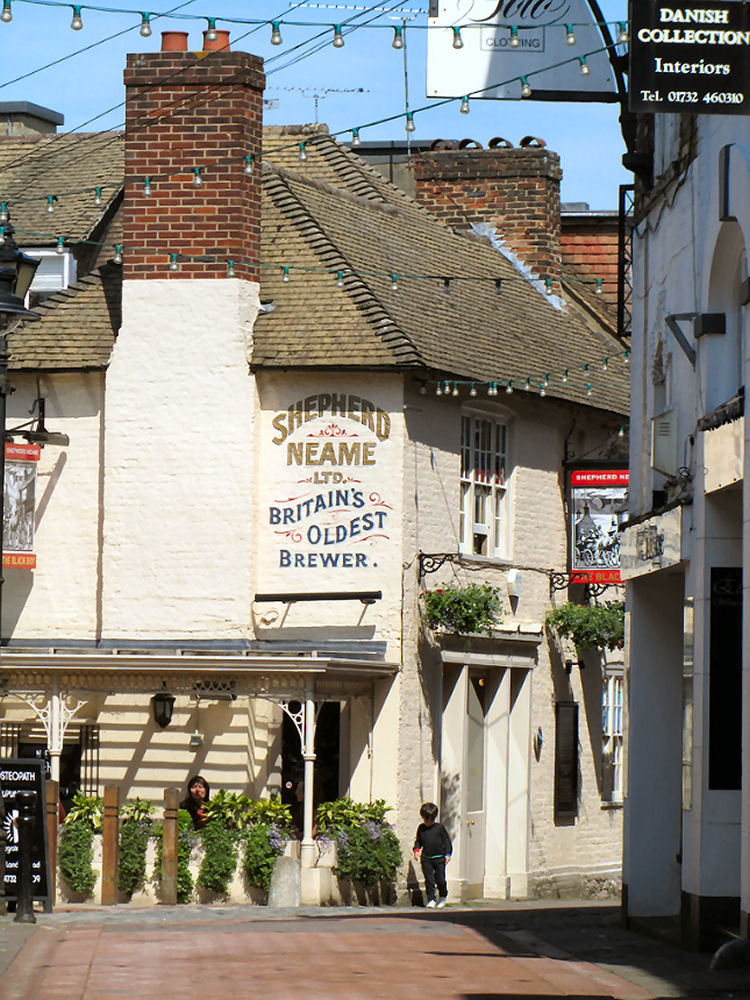
Photo taken in May 2013 from http://www.flickr.com
by Jules. |
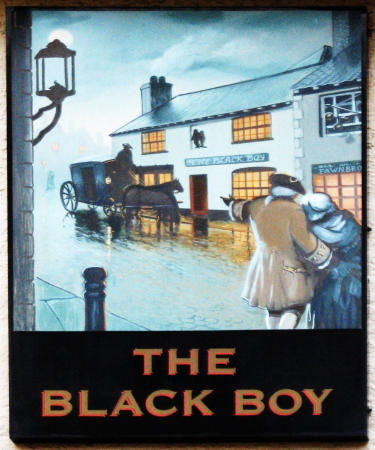 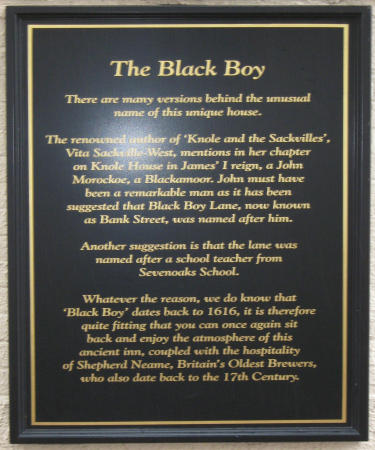
Above sign and plaque 2008.
With thanks from from Roger Pester
www.innsignsociety.com.
Info on Plaque:- The Black Boy.
There are many reasons behind the unusual name of this unique house.
The renowned author of "Knole and the Sackvilles", Vita Sackville
West, mentions in her chapter on Knole House in James' I reign, a John
Morockoe, a Blackamoor. John must have been a remarkable man as it has
been suggested that Black Boy Lane, now known as Bank Street, was named
after him.
Another suggestion is that the lane was named after a school teacher
from Sevenoaks School.
Whatever the reason, we do know that "Black Boy" dates back to 1616,
it is therefore quite fitting that you can once again sit back and enjoy
the atmosphere of this ancient inn, coupled with the hospitality of
Shepherd Neame, Britain's Oldest Brewers, who also date back to the 17th
Century. |
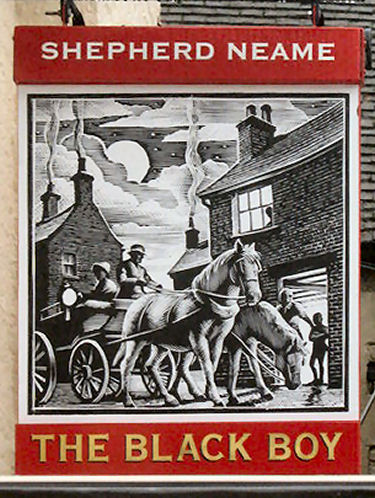 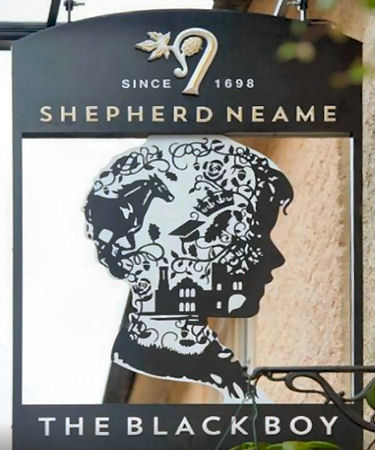
Above sign left 2011. Sign right 2019. |
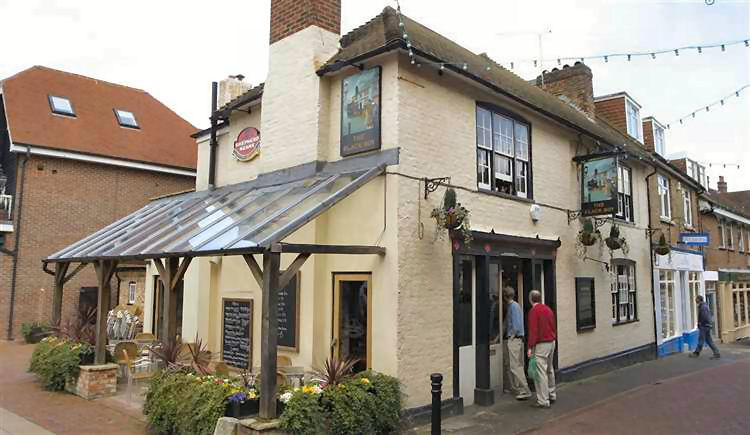
Above photo, pre 2009, by Peter Sill. |
It appears that 1959 the pub was supplied by Style & Winch. Later I am informed that the pub was leased to Friary Meux
Ltd. Today (2016) it is leased by Shepherd Neame since 1998 from Sevenoaks
District Council who own the site.
|
Kentish Gazette, 19 July 1775.
ROBERT DOLLING From the "Black Boy," in Sevenoaks, Kent, Returns his
most grateful acknowledgements to the Gentry and Others, who have
liberally conferred their favours on him, and humbly begs leave to
solicit a continuance of their support at the "Royal Oak Inn," in the
same town, which he has taken and fitted up in an elegant manner, for
the reception of his customers, who may depend on the most assiduous
endeavours, to render every kind of accommodation as satisfactory as
possible, and as shall secure their future indulgences to their
grateful, obliged, and obedient humble servant.
Robert Dolling.
|
|
From the Kentish Gazette, 2 August 1842.
DEATH.
July 16, at Sevenoaks, Mrs. Mary Clark, widow, many years landlady of
the "Black Boy Inn," aged 55.
|
|
From the Kentish Gazette, 12 November 1844.
WHEREAS, a Petition of JOHN McALEAVEY, of the “Black Boy,” SEVENOAKS, in
the county of Kent, licensed hawker, an Insolvent Debtor, having been
filed in the Court of Bankruptcy, and an Interim Order for Protection
from Process having been given to the said John McAleavey under the
provisions of the statutes in that case made anti provided the said John
McAleavey is hereby required to appear in Court before Joshua Evans,
Esquire, the Commissioner acting in the matter of the said Petition, on
the 27th day of November instant, at Two o’clock in the afternoon
precisely, at the Court of Bankruptcy, Basinghall Street, London, for
his first examination touching his debts, estate, and effects, and to be
further dealt with according to the provisions of the said statutes; and
Notice is hereby given, that the choice of Assignees is to take place at
the time so appointed.
All persons indebted to the said John McAleavey, or who have any of his
effects, are not to pay or deliver the same but to Mr. P. Johnson, 20,
Basinghall Street, the official assignee, nominated in that behalf by
the Commissioner acting in the matter of the said Petition.
|
|
From the Maidstone Journal, February 1862.
Escape from a lock up.
Mary Jones and Henry Jones were charged before Multon Lambarde on Monday
17th February 1862 at the Magistrates' Clerk's Office, Sevenoaks; with
having stolen 12 shillings 6d from the person of Edward Jury.
The
evidence described by the Maidstone Journal as "rather lengthy, and
unfit for publication" was given simply as follows:- The female prisoner
enticed the prisoner (who was an old man over sixty) down a passage near
the "Black Boy Inn" and in conjunction with the male prisoner, robbed him
and at once decamped.
The prosecutor gave information to Superintendent
Coleman and he immediately went in pursuit of the prisoners, and after
much difficulty succeeded in capturing them. They denied the charge
before the magistrate, but were committed for trial and taken to the
lock-up, where they were confined in separate cells.
Police Constable
Spear, on going to the lock-up, the next morning, found the lock of the
outer door forced off, and the prisoners gone, he also found a portion
of the brickwork of the back window broken away, as if someone had
assisted them from the outside. The alarm was at once given, and every
exertion was used to trace the prisoners, but without success.
The
Maidstone Journal commented that "perhaps the Court of General Sessions
will now see the necessity of providing accommodation for a resident
constable at this lock-up; if this had been the case now, these two
prisoners could not have escaped."
|
|
From the Kent and Sussex Courier, 1 May 1874.
Sevenoaks Petty Sessions. Friday, April 24th.
Licence Transfer.
The licence of the "Black Boy Inn" was transferred from W. G. Todman to
W. Purday.
|
|
From the Kent and Sussex Courier, Friday 10 April 1885.
Drunk.
Arthur Haynes, a young man, of respectable appearance, agent to
the Singer Sewing Machine Company, Sevenoaks, was charged with being
drunk and disorderly in the Black Boy Lane on Easter Monday.
P.C. Stroode said he was on duty in the High Street, Sevenoaks, at 9:15
p.m., on the night in question, when he saw the defendant in the Black
Boy Lane in company with several other young men. He was very drunk, and
call creating a disturbance. He advised him to go home, and several of
his companions endeavour to get him home. He, however, refused, and he
(witness) locked him up. Prisoner was very abusive.
Defendant said that in the evening of the day in question, he was in the
"Black Boy" having a game of billiards, when he was set upon by three or
four. He struck them, and would do so again if they came for him in that
manner.
Superintendent Waghorne said the defendant behaved very noisily at the
station, and he had been disturbed during the night by the defendant.
The chairman said that the defendant seemed to think he might come into
a country town and do what he liked, but he would find himself mistaken
and he would be fined 10s. and 6s. costs.
|
|
Sussex Agricultural Express 01 January 1889.
SEVENOAKS PETTY SESSIONS.
THE ADULTERATION ACT.
George Milton, of the "Black Boy," Sevenoaks, was summoned for selling
adulterated whisky, on the 19th of November. Supt. Waghorn proved that
the whisky was, on the certificate of Dr. Adams, the county analyst,
5.96 below the legal limit. - The defendant said that the jar was nearly
empty, and the strength had evaporated. Fined 20s. and costs.
|
|
From Sevenoaks Chronicle and Kentish Advertiser 30 August 1889.
SEVENOAKS PETTY SESSIONS, ANNUAL LICENSING DAY.
The houses during the past year have been generally well conducted, with
the following exceptions:-
Ale House, No. 35. George Milton, of the "Black Boy," Sevenoaks, fined
20s. and costs 9s., on the 28th December, 1888, for selling adulterated
whiskey.
|
|
From the Sevenoaks Chronicle and Kentish Advertiser, Friday 30 September, 1949.
RECOLLECTIONS AND CONVERSATIONS ABOUT OLD SEVENOAKS BETWEEN MARY AND HER AUNT.
By an Old Inhabitant.
THE BLACK BOY.
Aunt:- This house which I am going to talk a little about, is
called the "Black Boy Inn." I should think that it had been built some
centuries ago, as I have an extract which speaks about a Mr. Richard
Blackboy granting some acres of land (near the Vine) for the benefit of
the almshouses. This was in the 39th year of the reign of Queen
Elizabeth. (1597). I should think that this must have been the person that built
the "Black Boy" originally.
The first person that I ever heard of living there was a Mr. and Mrs.
Walter. They were respectable people, but after they had been there a
few years the business did not answer and they failed. After this they
left the house and Mr. Walter hired a small house, and a large room (up
the Coffee House yard) for a boys' school. He met with encouragement and
got on in his school. Soon after this he was elected to be Parish Clerk.
He lived many years much respected by all that knew him and before he
died he paid every creditor that he owed money to when he failed at the
"Black Boy." Many of the creditors were dead, but he insisted on paying
those whose right it was after the death of the creditors. If ever there
was an honest man he was one. After his death he left each of his
children a few hundred pounds. This man ought never to be forgotten, he
was an honour to our dear old Sevenoaks.
Mary:- I thank you dear Aunt. I did not expect such a capital tale about
the "Black Boy." I am very glad that you have recorded this interesting
account of good old Mr. Walter. |
I am informed by Keith Wade that the pub went under the name of "Evergreens"
at some time during the 1990s, and that the date of the Walters may be an
error, the earliest date he has managed to confirm that the pub was serving
is 1637 to date, although other unconfirmed years say 1616. Both being after
the said 1597.
|
From the
https://www.kentlive.news By John James, 27 June 2020.
'The Black Boy': Shepherd Neame to change 'potentially unwelcoming' Sevenoaks pub name.
The Faversham brewer has announced they will be changing the name of the
popular 'Black Boy' pub on Bank Street.
Many of us are waiting in anticipation for July 4 when all our favourite
pubs will be open again, however some Sevenoaks drinkers may be in for a
surprise.
Shepherd Neame yesterday (June 26) announced that it would be seeking to
change the name and signage of 'The Black Boy' pub on Bank Street.
The Faversham brewer said it was 'not a decision taken lightly' but the
current name was 'not potentially welcoming for all customers'.
The pub's new name will be 'The Restoration' in relation to the historic
pub's connection to King Charles II.
The historic Sevenoaks pub has been in the centre of the town since 1616
and has had many names in its past including "Evergreens" and
"Bank Street Brasserie."
Its current name 'The 'Black Boy' is thought to refer to the mining
history of the area, however in a time of heightened sensitivities, the
brewer has chosen to be proactive in the discussion around the pub.
News of Shepherd Neame's decision was broadly well received on Facebook
with many people coming out in support of the brewer's intentions.
One person said: "Great decision Sheps - proud to read that my local
brewery is stepping up on this.
"You’re not ‘destroying’ history, you’re making it!"
Another wrote: "It is good that this issue has been carefully considered
and researched, and that you have explained the history.
"It is a correct decision. Well done Shepherd Neame."
Some people voiced their concerns that the Brewer was 'erasing history'.
One man said: "I think it is wrong to change the name!
"It is not possible to make every one in this World happy, so... The
Black Boy is an important part of history where it is located!"
Another said: "Trying to rewrite history is not the answer to improving
race relations.
"Keep the name as it is. Also as you point out there are several reasons
why it may have its current name and no reason that I can see for you
making this decision."
In response to the heated discussions, Shepherd Neame left a statement
of clarification.
A spokesman said: "We appreciate your feedback, and would like to offer
our reassurances that we have not taken this decision lightly.
"We have considered the issues carefully, and while we appreciate that
some customers may not agree with our decision, we believe it is the
right thing to do."
|
|
From the
https://www.kentonline.co.uk By Liane Castle, 29 June 2020.
Shepherd Neame to rename The Black Boy pub in Sevenoaks after Black Lives Matter movement.
One of Kent's largest brewers has announced it will rename one of its
pubs in Sevenoaks in light of the recent global anti-racism protests.
Shepherd Neame says the "Black Boy" on Bank Street will soon become the
"Restoration," a name which instead focuses on its links to King Charles
II.
The Faversham-based brewer made the decision saying its current name
could be seen as unwelcoming to some of its customers.
In a statement on its website, the brewer said: "Shepherd Neame is
committed to equality and diversity in every area of its business, and
strives to create inclusive, welcoming pub environments for all
customers to enjoy.
"After much deliberation, we have decided to seek consent from relevant
authorities to change the name and provide new signage for the "Black Boy"
in Sevenoaks. It was not a decision taken lightly, but we recognise that
its current name is not potentially welcoming for all customers, and
feel that it is the right thing to do.
"In order to reflect the pub’s long history, we have chosen to focus on
its potential connection with King Charles II, and are therefore
proposing to rename it the "Restoration."
This is not the first time the town centre pub has had a name change. In
previous years it has been known as "Evergreens" and the "Bank Street Brasserie."
Shepherd Neame says the pub, which is one of the most historic in Kent,
dates back to 1616 with some suggesting it was named after John Morockoe
who worked at nearby Knole country house during the reign of James I.
The statement continued to say there are several other "Black Boy" pubs in
the UK and many theories around where their names came.
Some say it could be linked to coal mining or chimney sweeps, or the
nickname given to King Charles II due to his dark-hued skin and exile
during Cromwell’s reign. It is believed that a number of pubs changed
their name to the "Black Boy" to show their allegiance.
Since the death of George Floyd in the US, anti-racism protests have
been happening globally, with several towns showing solidarity here in
Kent.
|
LICENSEE LIST
WALTER Mr & Mrs ?1597+?
DOLLING Robert to July/1775+

BRIDGER John 1828+

CLARK Foreman 1832-41

CLARK Mary (widow) 1841+ (age 45 in 1841 ) )
WHITBY Thomas Brand 1845+
LEBAS George 1851-61+ (age 43 in 1851 ) )
WALE William 1871+ (age 33 in 1871 ) )
TODMAN W G to May/1874
PURDAY William 1874+
ASHDOWN William 1881-82+ (age 43 in 1881 ) )
MILTON George 1889-91+
MILTON Emily M 1891+ (managing inn age 30 in 1891 ) )
BARTON Harry 1903-18+

OAKLEY John W 1922-38+
FRANCIS William G 1939+
KNIGHT Dennis & Janet 1970+
https://pubwiki.co.uk/BlackBoy.shtml
 From the Pigot's Directory 1828-29 From the Pigot's Directory 1828-29
 From the Pigot's Directory 1832-33-34 From the Pigot's Directory 1832-33-34
 From the Kelly's Directory 1903 From the Kelly's Directory 1903
 Census Census
|








